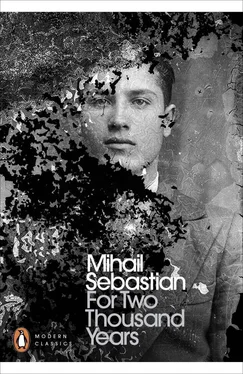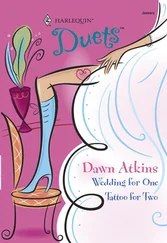‘Two thousand years? Do you think Zionism has something of those two thousand years in it? Do you think that these boys of Jabotinski’s who wear boots and salute each other like soldiers, who ride bicycles on Saturday and can say “Give me a cigarette” or “Let’s go to a football match” in Hebrew — do you think these boys have anything in common with those two thousand years of our blood? Two thousand years through flames, through disasters, through wandering come to us through the history of the ghetto. It’s a history lived under lamplight. “We want sunshine,” they shout. Good luck to them — and let them become footballers. They’ll get plenty of sunshine then. But this lamp by which I’ve read so many hundreds of years, this lamp is Judaism — not their sunlight.’
‘You’re old, Mr Sulitzer. That’s why you talk like that.’
‘I’m not old! I’m a Jew — that’s what I am.’
*
I was slightly mistaken. Abraham Sulitzer is a Monsieur Bergeret only as a husband to Madame Roza. As an intellectual, however, in his relationship with ideas, he becomes dogmatic and overbearing. In defending the ghetto, he is no less intolerant than Winkler defending Zionism or S.T. Haim cursing about both. Extremism is their common vice.
I visited him on a couple of evenings but avoided arguing. He reads beautifully and I asked him to read to me from his favourite books. Several good hours of reading from Sholem Aleichem. A wonderful fellow and probably untranslatable. What sad humour, what lucid laughter, what a fine, acute critical sense, all enveloped in a melancholy of misery, of terror …
Grandma has died. Ten hours after a heart attack. Summoned by telegram, I arrived in time to hold her living hands in mine: those small, thin, bony hands that haven’t rested in seventy years; even in sleep they signalled restlessness.
She died slowly, fighting until the end, suffering terribly and completely conscious until the final moment, her eyes open, searching. The merciless lucidity of the dying! A slight glaze to the eyes, but aware in the final struggle, not allowing a single gesture, sign or shadow to escape her attention.
Why such resistance? Death comes, let it come. Receive it.
I would have wanted this old woman of ours to understand the end with simplicity and to smile in friendship, with acceptance. I would have wanted her to remember the Bible she read to me, the patriarch-friends, their harmonious wives, I would have liked her to remember the candles lit on Friday night, the white headscarf she wore when among the brass candlesticks, the bread she kneaded with her hands all her life, all these simple things, all these gentle joys, and to pass away in their homely glow.
Why such resistance? Why so much questioning? She seemed to cling to every minute, struggling with each one.
It reminded me of Grandfather’s agony, which was even more terrible, as in addition to physical suffering it was a quarrel with God and destiny, a final protest, a cry.
But she, Grandma, looking like a child disguised as a grandmother, should have died differently, more calmly, more easily …
*
How badly we die! We haven’t even learned to do that from the centuries of death we’ve passed through. We live badly, but we die even more badly, in despair, struggling. We miss our last chance to make peace and be saved. The sad Jewish death of people who, not living among the trees and the beasts, haven’t been able to learn the beauty of indifference in death, its simple dignity. The greatest Jewish sin — perhaps.
… And the terribleness of Jewish mourning. The vigil from the night before the burial, the tired, unbelieving shaking of heads of the women keeping vigil, the lament of the Kaddish.
A single beautiful thing: the white death shroud. There could be something regal in this return to the earth, a good, generous solemn fact. But we mutilate it with our despair, which is suffocating. We call ourselves sceptics, but we don’t deserve such praise. I’ve seen how they cry at a Jewish funeral, and I know nothing more unrestrained, more awful. To cling so stubbornly to this life, to renounce all else so as not to give it up, to choke it with your desperate love, to believe yourself lost when you have lost it — such a terrible inability to rise above it.
Whoever has ever leaned against a tree, who has ever thought with melancholy of his loneliness, can’t fail to meet death without a feeling of being a bit above it, and smiling at it nonchalantly and indulgently, with friendliness, with gentle farewell, with a certain sensual thrill.
Our grieving is visceral, tyrannical, uncomprehending. And, more seriously, it is lacking in love. Of the many trivial aspects of the Jewish sensibility, this unrestrained mourning is the most unworthy. I think, however, that it is something we have accustomed ourselves to do here, in the ghetto. Death in the Bible is a glorious event.
Mama’s pain saddens me. It irritates me, in fact, as I’d like her to be accepting rather than resigned. There were moments when we almost quarrelled. ‘She was my mother and I want to mourn her,’ she snapped, defending her right to grieve. (I sometimes have the mean impression that her mourning is a new form of indulgence and that she deliberately seeks it.)
Of course, I’m unfair. I know how much love wounds, without forgetting Grandma’s death. But that’s exactly what I don’t want to forgive — this love which has greater rights than death. This love that struggles to tie down and preserve a shade that has passed on. Such rights don’t and can’t exist.
And there’s something else that disturbs me. I feel that my personal freedom is affected. I can’t accept that someday, when my turn to die comes around, I will leave in my wake such wild, desperate, pointless suffering. I don’t want to be loved so unrestrainedly.
If I were asked one day to give up my life for something — for a revolution, for love, for whatever nonsense — the idea that Mama would suffer for me the way she’s suffering now horrifies me. Does she have any right to suffer in this way? Doesn’t this trespass on matters which are mine to deal with? Isn’t this an obstacle to me fulfilling my destiny? Isn’t it a terrible moral pressure? She loves too unfairly, too oppressively, to the point at which it becomes suffocating and undignified. There is too much devotion in the Jewish family, too many gushing emotions, too many sacrifices made. Terrible advantage taken of good children and mothers prepared to sacrifice themselves. There is no reticence, no coolness. This leads inevitably towards a sense of obligation. I envy the cool and dignified reserve of the peasant: a formal farewell and off they go into the world. And when death comes, it comes like a relative.
The only person at home not shaken by Grandma’s death is Grandmother. At ninety years of age, there she is outliving the other grandparents, who were so much younger and more passionate to live than she. ‘God doesn’t choose. Today it was her, tomorrow it will be my turn.’ I think living and dying is all the one to her. Grandmother is of father’s tribe, a people that dies late, in old age, at a hundred years old, placidly, without regrets. Their deaths are simple and good. But my mother’s branch of the family has a completely different way of dying, and this was how Grandma passed away. They die by burning up swiftly, with short agonies, in which you feel the last shudder of pointless struggle. Their health is tenuous, nervous, maintained through unflagging effort and hard-won daily victories over a weary body. It’s more than an intellectual resistance, a continual act of will. One day, the inner arch that holds them suspended in tension suddenly collapses. It’s a Jewish death.
Читать дальше












